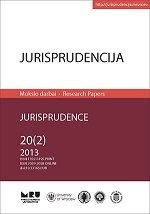Straipsnyje aptariami veiksniai, lemiantys teisės ir politikos institutų santykio atsiradimą bei aprašomas svarbiausių teisės teorijų ir politikos sud
The Models of Relationship of Law and Politics in Jurisprudence and Their Applicability
Author(s): Vytautas Šlapkauskas, Ramunė MiežanskienėSubject(s): Law, Constitution, Jurisprudence
Published by: Mykolas Romeris University
Keywords: Law; Politics; Law-making; Jurizidation of politics; Relation between law and politics
Summary/Abstract: This article is aimed at representing the approaches of legal theory to the interaction between law and politics and to depict the main national features of the relationship between law and politics. The analysis is based on the adoption of methodology of fundamental work of Mauro Zamboni “Law and Politics”. The adoption of methodology was used only partially, while seeking to identify and clarify the features of static, dynamic and epistemological aspects of the relationship of law and politics in Lithuania. Researchers have faced the problem of a diverse approach to the definitions of law and politics, and it has been resolved by focusing only to the researches representing the standpoint of legal theories. The analysis has led to the findings that there are reasonable grounds to assume that legal content (referring to the “static” aspect of law and politics) in Lithuania is flexible to outgoing politics. This implication is based on 1) the noticeable disproportion of legal regulation in different areas of social life, 2) law-making priority areas determined mostly by the choice of political actors will and 3) through changed execution of legal norms, prefering the forms which could be more cost effective (alternative dispute resolutions) and more suitable for changing social environment. What concerns the “dynamic” aspect of the relation between law and politics, it is implicated that there are backings for both open and closed law making, but at the same time more open legislative features are observed than the closed ones. This tendency is identified in the legislative process, where the help out of non-legal world is applied (using sociology) and the persistence of politicians to access and use the institutes of citizens’ legislative initiative (iniciatives for referendums or other legislative initiatives, the right to petition, etc.) is obvious. The reflection of „epistemological“ aspect of the relationship between law and politics in Lithuanian legal discipline reflects the general trend of international scientific community of law. It is considered to step back from the autonomous legal discipline concepts and in this way the appropriate conditions for incorporation of different categories from other scientific fields are created. On the other hand, a reserved cautious attitude of both researchers and research institutions on the conjunction of law and political science is observed. The interaction between law and economics and business or public relations is still prioritized.
Journal: Jurisprudencija
- Issue Year: 20/2013
- Issue No: 2
- Page Range: 429-450
- Page Count: 22
- Language: Lithuanian

